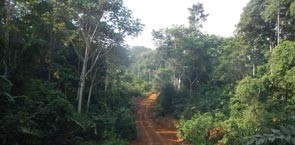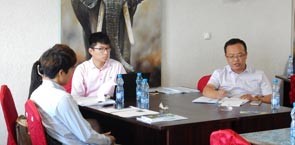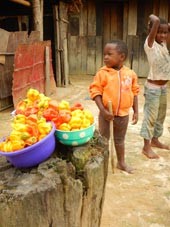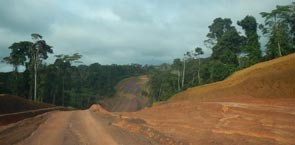The project completed a three-day workshop in Libreville where attendees from a wide range of Chinese forest management companies operating in Gabon attended. In addition, the Gabonese legality grid was revised to comply with the EUTR and other similar regulations. For this, local experts gave their input to the legality grid during an open consultation meeting in Libreville in November 2015.
Gabon is a country housing an array of tropical wildlife and beautiful scenery. Forest covers around 80 percent of the inland and it holds the second largest consecutive forest area in the world. However, illegal logging is a major driver of deforestation in the region. It is difficult to calculate the range of the illegal logging, but some sources state that a yearly amount of about 10 million USD is lost in Gabon due to illegal logging.
A rather small group of Chinese companies dominate China's timber import from the Congo Basin, and these companies influence on the region has grown significantly during the past decade. The timber export to China from the Congo Basin links to the EU timber market, as a large proportion of the timber ends on the EU market.

Identifying Potential Gaps
In addition to the provided training and knowledge to the Chinese companies operating in Gabon, in legality and FSC certification requirements, this project aimed at conducting pre-assessments of ten companies to help identify potential gaps concerning legality within the timber production.
The project was a joint project between Rainforest Alliance and Preferred by Nature (formerly known as NEPCon), in the role of conducting the pre-assessments. Rainforest Alliance conducted the FSC pre-assessments and Preferred by Nature conducted the legality pre-assessments.
WWF Gabon also supported the project by helping with logistics and establishing contact to the companies in Gabon.
The purpose of the audits was to give the Chinese companies the opportunity to reach a clear perception of the gaps between their current operation and the requirement of the EUTR or of FSC. After the audits, the companies were provided with a confidential report demonstrating the gaps. The confidential report enabled the Chinese companies to work towards a legality or FSC certification, and in this way the pre-assessments gave the companies a head start in the preparation for a legality or a FSC audit. FSC or legality certification is an asset to the companies when urging to enter large markets such as the European or US timber market where respectively the EUTR and the Lacey Act sets requires that the timber is produced legally.

Project Objective and Approach
The project had an overall objective to improve the forest management practices of Chinese companies operating in Gabon. Two specific objectives were formulated to help support the overall purpose of the project:
-
Assessment and gap analysis of the practices in regards to legality and the FSC certification scheme
-
Strengthening the consideration of aspects related to wildlife management

To achieve this, a number of activities were completed throughout the project period. The first task obtained and revised the Gabonese legality grid, followed by a country stakeholder consultation. The purpose of this process was to make the Gabonese legality grid conform with the EUTR. The next step of the project was to conduct a field testing of the preliminary version of the updated legality grid, after which a second revision took place.
After this, the stakeholders training was initiated. WWF Gabon identified relevant stakeholders and these were invited to participate in a workshop, where they received training in the audit process and the system requirements in certification systems.
The third and last phase of the project was the gap analysis and implementation of 10 pre-assessments of the Chinese companies operating in Gabon. Preferred by Nature and Rainforest Alliance conducted onsite pre-assessments of the individual companies, and issued two reports per company containing a gap analysis, demonstrating the company’s compliance with respectively legality and FSC requirements.
All this information was gathered in a report, that summarised the findings and identified gaps, without disclosing the individual companies that have undergone the pre-assessments.

Project results
To summarise, the results of this project are:
- A stakeholder consultation on the legality matrix
- A legality grid for Gabon, revised and field tested
- Training of stakeholders and operators on the legality in logging and certification systems
- Implementation of 10 gap analysis of legality with the participating beneficiaries
- A report summarising the identified gaps
- A validation workshop about the results of the variance analysis
Feel free to contact us if you wish to engage or learn more about this project:

